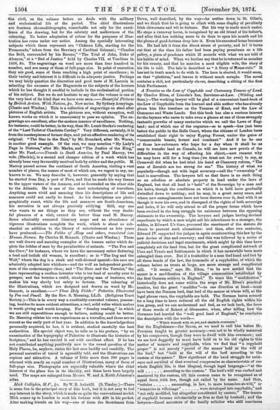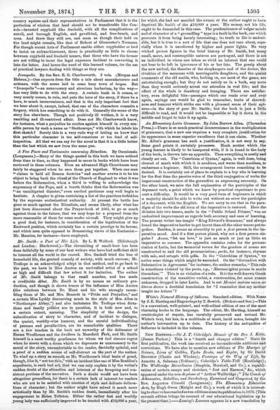A Treatise on the Law of Copyholds and Custonany Tenures
of Land. By Charles Elton, of Lincoln's Inn, Barrister-at-Law. (Wilding and Sons.)—The working lawyer will be glad of a convenient hand-book of the Law of Copyholds from the learned and able author who has already given him like treatises on the Tenures of Kent, and the Law of Commons and Waste Lands. But this book has also a curious interest for the layman who cares to take even a glance at one of those strangely fantastic growths of many centuries which we call the Laws of Eng- land ; and of which one of the cognates—so to speak—has just been before the public in the Rolls Court, where the citizens of London have established their right to enjoy Epping Forest, under the guise of "commonable beasts, levant and couchant." And if he be one of those law-reformers who hope for a day when it shall be aa easy to transfer land as Consols, he will see here new proofs of the difficulties in the way of effecting his object,—new reasons why he may have still for a long time (we trust not for ever) to say, as Cromwell did when he had tried his hand at Chancery reform, "The sons of Zerniah are too strong for me." The history of what we popularly—though not with legal accuracy—call the " ownership " of land is marvellous. The lawyers tell us that there is no such thing as an allodium or absolute property in land under the laws of England, but that all land is " held " of the Sovereign by a man and his heirs, though the conditions on which it is held have gradually dwindled down to nothing; and he may, in a great many cases, and where new entanglements have not been thrown over it, deal with it as though it were his own, and in disregard of the rights of both sovereign and heirs, if he will only attend to all the proper forms which have been evolved in the long struggle for existence between the opposing claimants to the ownership. The lawyers and judges having devised expedients by which a man might sell his inheritance to a stranger, the nobles, in Edward L's time, procured the enactment of the statute De Donis to prevent such alienations: and then, after two centuries, Edward IV. supported the judges in again counteracting this law by the new device of line and recovery; and this was followed by a series of judicial decisions and legal enactments, which might by this time have completely set the land free, but for the great complicated network of Uses and Trusts and Settlements in which it has meanwhile been more entangled than ever. But if a freeholder is a man tied hand and foot by all these bonds of the law, the trammels of a copyholder, of which the volume before us treats at large, are more strange and complicated
still. "It seems," says Mr. Elton, "to be now settled that the manor is a modification of the village communities 'established by the first German settlers in England." To trace this " modification " historically does not come within the scope of Mr. Elton's practical treatise, but the great "modifier"—in one direction at least—must have been the Norman lord, that lord of the manor at whose will, as the legal phrase runs, the copyholds are held. The Norman baron seemed for a long time to have reduced all the old English rights within his iron grasp, and we can understand and feel, as we look back, the force of those words of Robert of Gloucester, when, after telling how the Norraans had harried the "well good land of Englond," ho concludes the description with the words— "Which woneth with us yet, and shalleth evermore."
But the Englishman—the Saxon, as we used to call him before Mr. Freeman taught us greater accuracy—was not to be wholly mastered by his conquerors, though they were to dwell with him evermore ; and we see how doggedly he must have held on to his old tights in this matter of manors and copyholds, when we find that "a copyhold proper" is not merely "parcel of the manor held at the will of the lord," but "held at the will of the lord according to the custom of the manor." How significant of the bard struggle for exist- ence and survival of that eventual compromise so characteristic of our whole English life, is that illogical, though legal language—" at the will according to the custom." The lord's will was curbed and mastered by the custom, till this custom came to be recognised as of equal force with law, though not called by the name. And thus, "estates amounting, in law, to mere tenancies-at-will," or "tenancies in villeinage" were developed into copyholds," and "not only modified, but altogether constituted by custom." The tenure of copyhold became substantially as firm as that by freehold; and the lawyers—lineal ancestors of the family solicitor who still convinces
country squires and their representatives in Parliament that it is the perfection of wisdom that land should not be transferable like Con- sols—invested copyhold like freehold, with all the complications of entAil, and borough English, and gavelkind, and free-bench, and uses. And there they still are, and seem as :though their hold on the land might remain, like that of Robert of Gloucester's Normans. For though recent Acts of Parliament enable either copyholder or lord to insist on enfranchisement, there is practically so little to choose between copyhold and freehold tenure, that those who have the former are not willing to incur the legal expenses incident to converting it Into the latter. And hence the need of this learned volume, for the use of practical lawyers dealing with things as they are.







































 Previous page
Previous page